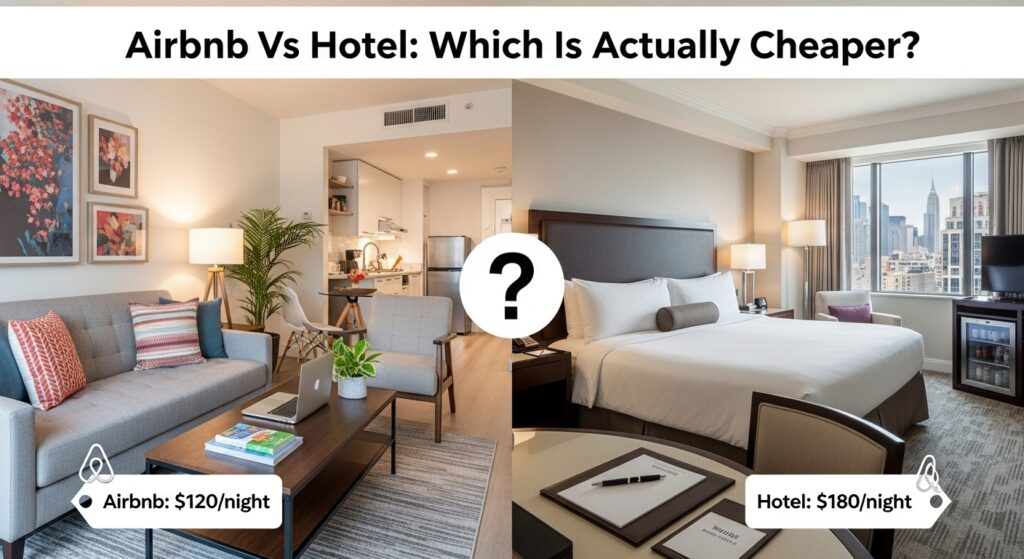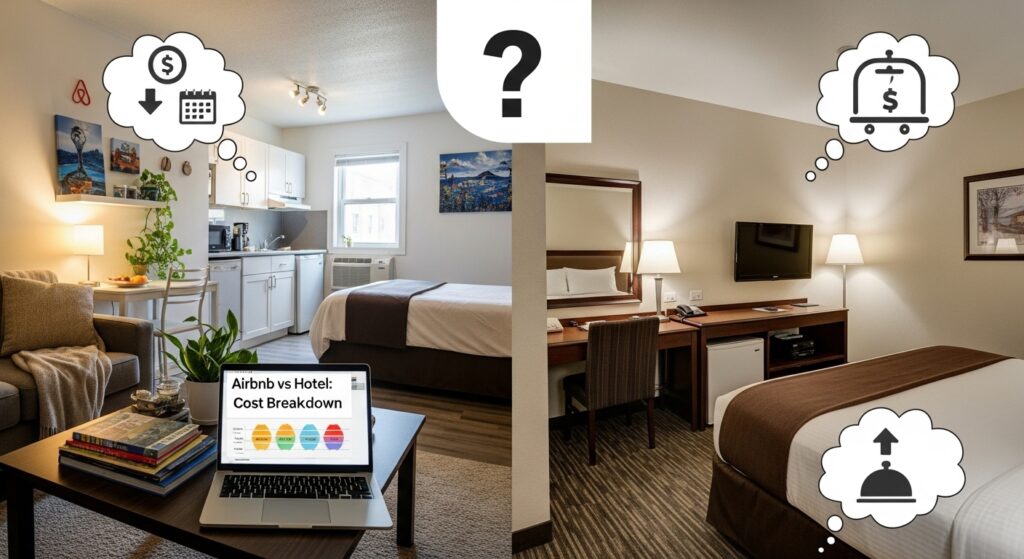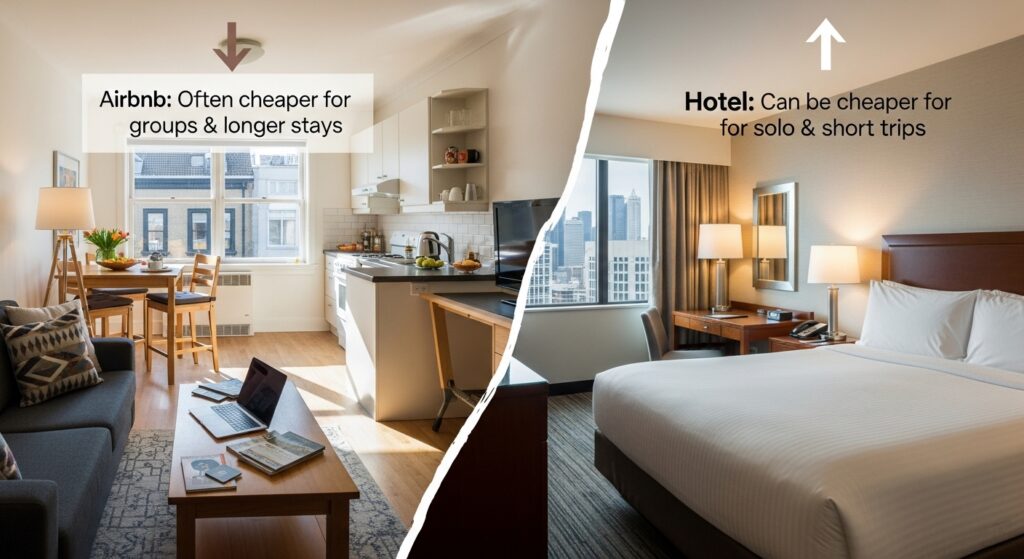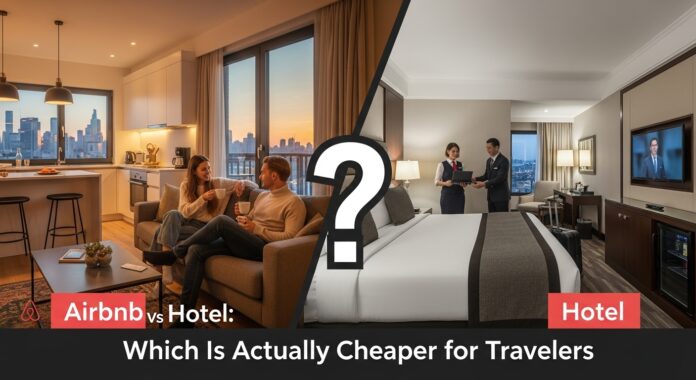Travelers today face a tough dilemma. Should you book that cozy Airbnb apartment tucked in a local neighborhood, or stick to the convenience and predictability of a traditional hotel room? On the surface, Airbnb seems cheaper and more “home-like,” while hotels promise comfort, security, and consistent service.
But the real question every traveler Googles is:
Airbnb vs Hotel – Which is truly cheaper once all the hidden costs and perks are added up?
In this definitive travel cost comparison guide, we’ll break down real-world pricing, fees, and traveler scenarios that determine whether Airbnb or hotels actually save you money. By the end, you’ll know exactly which option aligns with your budget, trip style, and personal needs.
Why This Debate Matters More for Airbnb and Hotels?
The Airbnb vs hotel debate isn’t just a travel preference – it’s now a financial calculation. Global inflation, changes in Airbnb’s fee structure, and the rise in hotel resort fees have reshaped how affordable different accommodations feel today.
- Hotel chains are fighting back against Airbnb’s dominance by offering complimentary perks like free Wi-Fi, breakfast, and loyalty program benefits.
- Airbnb hosts, on the other hand, have increased cleaning fees, strict check-in rules, and varying service quality, making budget-conscious travelers reconsider whether the platform is still a money-saver.
With millions of travelers searching for the answer daily, let’s dive deep into the numbers and real scenarios.

Quick Cost Table: Airbnb vs Hotel
Here’s a basic side-by-side cost comparison in popular travel markets (average nightly rates):
| New York City | $210 | $260 | Airbnb: $75 cleaning fee / Hotel: $40 resort fee |
| Los Angeles | $180 | $220 | Airbnb: $60 cleaning fee / Hotel: $35 parking |
| Paris | €150 | €190 | Airbnb: €50 cleaning fee / Hotel: €25 city tax |
| Bangkok | $45 | $65 | Airbnb: $15 cleaning fee / Hotel: Free breakfast |
| Dubai | $120 | $145 | Airbnb: $40 cleaning fee / Hotel: $35 tourism fee |
Takeaway: For short stays (1–2 nights), hotels often win. For longer stays (5–7 nights), Airbnbs usually turn out cheaper—but not always.
Breaking Down Hidden Costs You Often Forget
When travelers compare prices, they usually look at the headline nightly rate only. But that’s misleading. Actual costs include several hidden charges.
Airbnb Hidden Costs
- Cleaning Fees – A $100 cleaning fee on a 2-night stay adds $50/night.
- Service Fees – Airbnb service fee ranges from 5–15% of the booking total.
- Security Deposits (sometimes refundable, sometimes not).
- Strict Cancellation Policies – Some non-refundable bookings lock your money if plans change.
Hotel Hidden Costs
- Resort Fees – Ranging from $20–50/night in the U.S., especially in Las Vegas, NYC, or beach resorts.
- Parking Charges – $20–$40 per night in major cities.
- City Tax / Tourism Tax – Common in Europe & Asia.
- Food & Beverages – On-site dining is often much pricier than a local meal.

Scenarios: When Airbnb is Cheaper, and When Hotels Win?
It’s impossible to crown an overall winner without context. Let’s break it down by travel style.
Solo Traveler
- Airbnb: Often more expensive per person, especially for short trips (due to cleaning fees).
- Hotel: Wins with budget-friendly capsule or 2-star rooms in many cities.
Family Vacation
- Airbnb: Clear winner. A 2-bedroom apartment lets families cook meals and avoid booking multiple hotel rooms.
- Hotel: Can get costly for 4+ people. Family suites are expensive.
Business Travelers
- Airbnb: Riskier (unreliable check-in, Wi-Fi quality issues).
- Hotel: Reliable, with business centers, meeting rooms, and loyalty program perks.
Couples Getaway
- Airbnb: Romantic, unique stays (treehouse, villa, loft). Cheaper for longer stays with privacy.
- Hotel: Great for weekend city trips or couples who want spa/gym access.
Long-Term Stays (1 Week+)
- Airbnb: Usually much cheaper. Discounts for weekly/monthly rental apply. Kitchen access saves on food.
- Hotel: Costs pile up fast. Budget hotels may lack necessary amenities.
Cost Beyond Money: Value and Experience
Yes, cost drives decisions—but let’s not ignore value.
- Hotels Offer → Consistency, daily cleaning, concierge, safety, loyalty points.
- Airbnb Offers → Space, kitchen access, authenticity, long-term affordability.
Sometimes the cheapest option isn’t the best deal. A free hotel breakfast for 4 people can offset higher room costs. An Airbnb with a full kitchen might save $100+ on dining out per day.

The Psychological Factor: Stress vs Simplicity
- Hotels = simplicity. Book, check-in at the front desk, and everything is standardized.
- Airbnb = uncertainty. While many are great, some have issues like misrepresented photos, last-minute cancellations, or strict house rules that turn off travelers.
Your tolerance for risk and inconvenience should factor into your decision just as much as the nightly rate.
Expert Budget Hacks for Each Option
How to Save on Hotels?
- Use points and loyalty programs (Hilton, Marriott, IHG).
- Book in advance and avoid weekends in high-demand cities.
- Compare directly on hotel websites vs. OTAs (Booking.com, Expedia).
How to Save on Airbnb
- Opt for longer stays to unlock weekly discounts.
- Always calculate per-night cost WITH cleaning fees before booking.
- Message hosts for last-minute discounts, especially during off-season.
Final Verdict: Which is Actually Cheaper?
The truth is—it depends on your trip type. But here’s the simple equation:
- Short stay (1–3 nights) → Hotels are usually cheaper & hassle-free.
- Long stay (4+ nights) → Airbnb wins, especially for families or groups.
- Business trip → Stick with hotels for reliability.
- Unique local experience → Airbnb apartments, villas, or boutique stays.
Rule of Thumb:
If you value predictability, go hotel.
If you value space + long-term savings, choose Airbnb.
FAQs: Airbnb vs Hotel Cost
1. Is Airbnb always cheaper than hotels?
No. For short stays, cleaning fees make Airbnbs more expensive.
2. Do hotels have fewer hidden fees?
Not really – resort fees and taxes can also add up.
3. Which is safer: Airbnb or hotel?
Hotels generally have better security and formal safety policies.
4. For families, what’s the cheaper choice?
Airbnb apartments usually save significant money vs booking two hotel rooms.
5. Are there alternatives to Airbnb and hotels?
Yes – hostels, serviced apartments, boutique stays, and guesthouses often balance cost and comfort well.
Final Words
When choosing between Airbnb vs Hotel for travelers, don’t just compare nightly rates. Smart travelers calculate all hidden fees, extra savings (like free breakfast or cooking meals), and the kind of experience they want.
For city breaks → hotels win.
For group or family vacations → Airbnb saves serious money.
For remote workers or extended stays → Airbnb is unbeatable.
Travel smarter: Add up cost per night + hidden fees – perks before booking. That’s the real way to know which one is actually cheaper.
